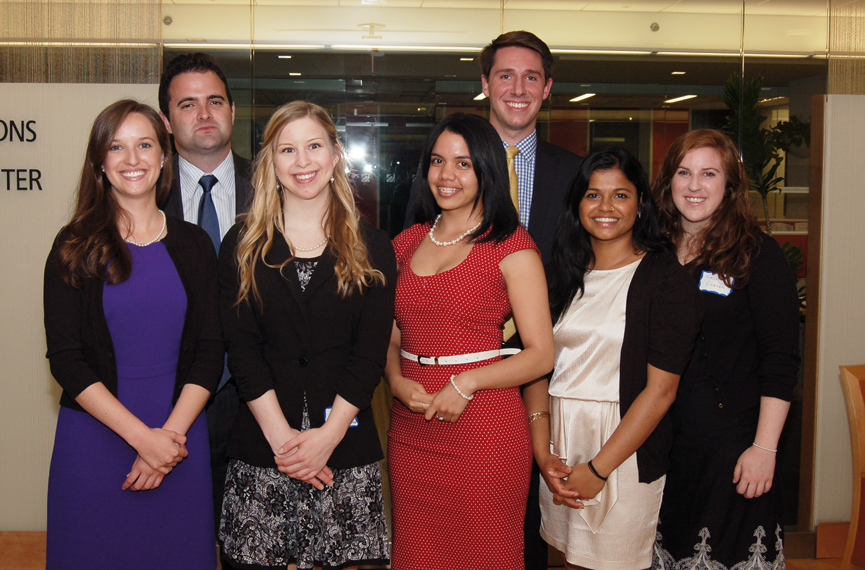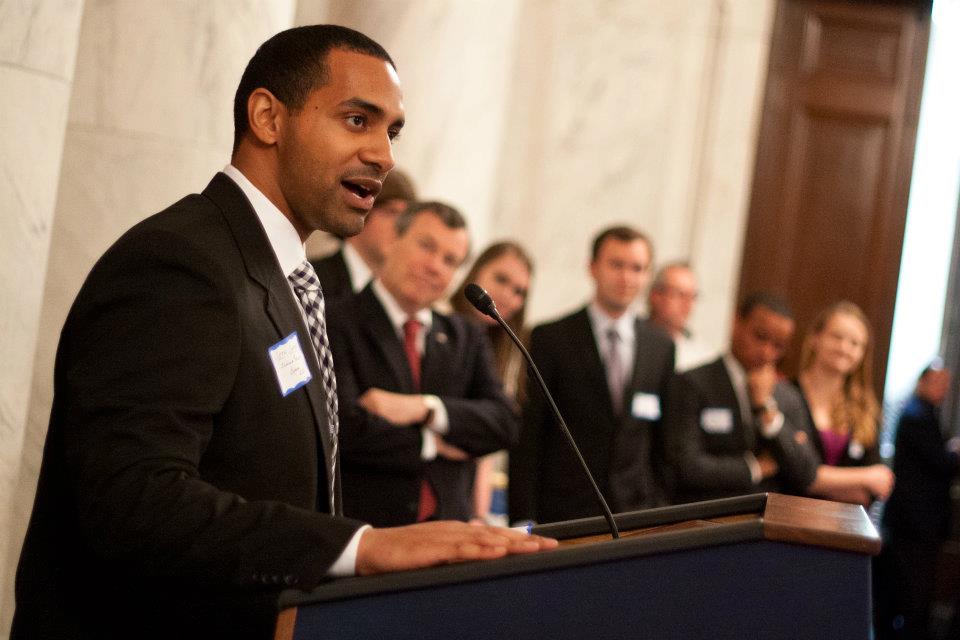
As a former 2005 Herbert Scoville Jr. Peace Fellow, I often share this program with aspiring fellows interested in working in the field of government, foreign relations and security. The Herbert Scoville Jr. Peace Fellowship is a competitive national fellowship program that provides recent undergraduate and graduate students with a 6-9 month opportunity to work on peace and security issues in one of tens of established Washington D.C. think tanks. Twice yearly, the fellowship selects 2-5 fellows who serve as full-time junior staff members at the participating organization of their choice. Fellows also have the opportunity to meet with policy experts throughout their fellowship. Many former Scoville Fellows now hold prominent jobs in international peace and security with domestic and international NGOs, the Federal Government, academia and media.
To learn more about this unique fellowship, we interviewed Cody Poplin who was a Fall 2013 Scoville Fellow at ReThink Media, a non-profit organization focused on building the communications capacity of nonprofit think tanks, experts, and advocacy groups.
1. What inspired you to apply for the Herbert Scoville Jr. Peace Fellowship?
I applied to the Scoville Peace Fellowship because I believed it would provide an excellent opportunity to begin contributing to issues of peace and security in Washington, D.C. I studied Peace, War, and Defense at the University of North Carolina and had continued this work immediately following graduation at the Centre for Policy Research in New Delhi, India as a Luce Scholar. While in Delhi, I explored the structural causes and global threats from South Asian insurgencies and how the United States could more effectively combat terrorism while setting ethical precedents for others. In particular, I was impressed by the quality of the organizations that Scoville paired fellows with, the discretionary funding for personal development that the fellowship provided, and the extensive alumni and board mentor network affiliated with the fellowship. I saw the Scoville as a fantastic launching pad for a long career of scholarly work and public advocacy in the center of the action.
2. What is a typical week like for a Scoville fellow?
I am not sure there is a “typical” week for a Scoville fellow as so much of the fellowship is what you make it. However, my time as a Scoville Fellow at ReThink Media provided amazing opportunities to work with leading professionals in peace and security issues on a daily basis. When I joined ReThink, much of my recent research had focused on U.S. drone policy around the world; however, I wanted to do more to move those ideas into action. ReThink’s roll as a messaging and media consultancy provided opportunities to engage issues I cared about from a new angle and to think about how to communicate complex policy issues to non-expert audiences in politically effective ways. All this work eventually culminated in the opportunity to work on a comprehensive audit of media coverage of drones, and to help brief leading advocacy, policy, and legal organizations on how they can move the ball forward for a limited, transparent, and ethical US targeted killing program.
My time as a Scoville Fellow also provided opportunities to attend events throughout the capital and to network with leading professionals I would have never met otherwise. I also took an Urdu class, utilizing my discretionary funding to enhance my language skills while meeting other young professionals in the DC area. I never knew exactly what a day might bring, but I knew that I would be in the loop and working on issues about which I was passionate.

3. What do you think made your application stand out?
The Scoville Fellowship is looking for young people with a demonstrated interest in broadly defined fields related to national and international security, arms control, and public advocacy. They preference applicants who want to come to Washington, D.C. and stay, directly shaping the policy-making here in D.C. There are a number of ways to demonstrate these interests, but I’ve found that the strongest applicants will be those with experience in critical regions and countries, publications on arms control or related issues, or extensive advocacy experience promoting causes central to peace and security. I think that my application was unique in that I envision a career in public advocacy related specifically to the national security law of emerging technologies. In my application and interview, I tried to narrate a vision around national security law and drones, identify a specific organization where I could develop the future skills I will need, and point to former alumni and potential mentor who could serve as a guide for the early steps in my career. Every applicant will have different strengths and weaknesses, but effectively telling your story and how your future will be tied into national security is central to selection.
Cody Poplin is a research assistant at the Brookings Institution where he focuses on national security law and policy. He graduated from the University of North Carolina at Chapel Hill with majors in political science and peace, war, and defense in 2012. He was a 2012-13 Luce Scholar based New Delhi, India. Follow him on Twitter @cmpoplin.
© Victoria Johnson 2014, all rights reserved.